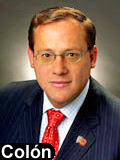 Brian Colón, chair of the Democratic Party of New Mexico, is apologizing for problems with Tuesday’s presidential caucus, and also explained why the reporting of some votes, including those from three polling places in Rio Arriba County, has been delayed.
Brian Colón, chair of the Democratic Party of New Mexico, is apologizing for problems with Tuesday’s presidential caucus, and also explained why the reporting of some votes, including those from three polling places in Rio Arriba County, has been delayed.
Pointing out that turnout on Tuesday was much greater than the 105,000 who showed up in 2004, Colón said the story could have been about how the two Democratic presidential candidates inspired New Mexico Democrats to vote.
“What we can write about is how two candidates came and lit the state on fire in less than 10 days, and that’s amazing,” he said. “I regret that I allowed this other situation and the party’s organization to become the story instead of that.”
The party wasn’t adequately prepared for the approximately 150,000 people who voted on Tuesday. It ran out of ballots at some locations, had only one polling place and a long line in Rio Rancho and had trouble reporting accurate and current results on its Web site on Tuesday evening and today.
Most glaring is the fact that final results and a declared winner may still be days away, while every other contest held around the nation on Tuesday has already led to a winner.
As it stands, Hillary Clinton is leading Barack Obama with 66,173 votes to his 65,963. Yet to be considered are the votes from three polling places in
Explaining the situation in
Realizing later that it had incomplete information, the state party tried to contact the managers, but it was well after midnight, Colón said, and they could not be reached. The party decided not to post those polling places’ results without the totals for all candidates.
Asked why the managers were allowed to take the ballot boxes home, Colón said many in rural areas across the state were allowed to do that because of the late hour and, in some cases, bad weather. They agreed to deliver the ballot boxes to state party officials this morning.
To ensure that nothing unethical happened while the ballot boxes were in the manager’s homes, those managers, before leaving the polling places, had to call in the final numbers to the state party in front of other workers. The state party today checked the numbers that were called in against the ballots in the boxes to ensure they matched.
In all cases, including those in
He said he expects the results from the three polling places in
Colón said the holdup with the outstanding results from one polling place in Sandoval County is having to sort out which ballots were cast by people living in the First Congressional District and which were cast by people living in the Third Congressional District, since the polling place included precincts in both districts and the ballots have to be sorted by district.
As to the almost 17,000 provisional ballots that were cast on Tuesday, Colón said the two candidates’ campaign staffs and the state party were still working out procedures for considering them. I asked how long it will take to sort through and count provisional ballots, and he said the goal is to ensure that as many votes are counted as should be.
“Look, we want to make sure that, instead of being fast, we’re accurate,” Colón said. “We have until Feb. 15, and if we need that time, we’re going to take it.”
 Gov. Bill Richardson released a statement tonight expressing his disappointment at how the caucus was run.
Gov. Bill Richardson released a statement tonight expressing his disappointment at how the caucus was run.
In the news release, the governor took credit for the success of the 2004 caucus, saying it was well-organized, well-funded and well-executed “through his personal efforts and those of his organization.” This year, the release stated, he was focused on running for president and is now focused on the Legislature.
“The New Mexico Democratic Party and New Mexico Democrats were wholly responsible for this caucus in the absence of the governor’s time and his organization,” the release stated. “Despite their best efforts, the enormous turnout overwhelmed party officials in some places.”
“In addition, the delay in results was extremely disappointing,” he said. “I have expressed my frustration to Democratic Party Chairman Brian Colón and I told him that I stand ready to help the party in any way that I can.”
Colón said he understands the governor’s frustration.
“I share his disappointment but, most importantly, it’s disappointing that I let the voters in New Mexico down, not just the governor, and I take full responsibility for that,” he said.
The caucuses are funded by the parties, not taxpayers, and are run by volunteers.
“If they want a voice in the process, they need to support the caucus with their time and financial contributions,” he said.
The state’s Republicans opted in 2004 and this year to not hold their own, early caucuses, but to instead vote in the presidential primary at the same time that they vote in down-ticket races during the tax-payer funded GOP presidential primary in June.